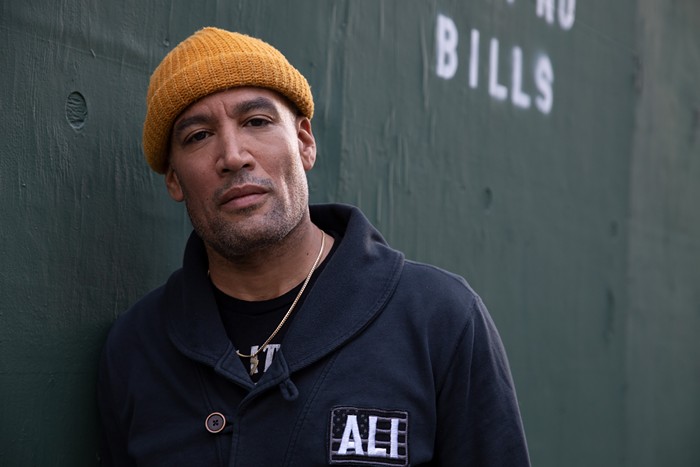"WE DON'T HAVE a formula for songwriting, or a particular style," says Hausu guitarist/vocalist Ben Friars Funkhouser. "We don't have anything to fall back on. Every song has to come out of the ground, basically. None of the songs are going to just appear—they have to be worked out."
The members of Hausu are discussing their first album, Total, over beers at Reel M Inn, one of the last dive bars on SE Division. Even in these unpretentious surroundings, there's noticeable bulk to the collective brainpower amassed at the table (your narrator excluded). The four bandmates of Hausu, all born in the '90s, are in varying stages of their educations at Reed College—bassist Carl Hedman has just graduated, while guitarist Alex Maguire, drummer Santi Leyba, and Funkhouser each have one year of school left—and their conversation, while casual and full of the usual inter-band jokes, is a little more elevated than the typical rock-dude interview.
The academic origins of Hausu are worth noting, but their music is anything but bookish. Filled with exhilaration, frustration, and nervy energy, Total is a guitar-rock album that embraces many musical pasts while remaining defiantly original. There are clanging major chords alongside tiptoeing guitar interplay and fractured moments of dissonance. There are explosions of chaos with Funkhouser's ferocious roaring next to beautiful moments of ordered resolution. It's a brilliant record, a fully realized and surprisingly dark debut that transcends the band's early buzz when they formed a couple of years ago.
Of that growth, Maguire says, "We started playing different things, incorporating different elements that we wouldn't have done before—more noise rock, more atonal things. I think the record is gonna be pretty weird for some people."
"That was the nature of it," adds Hedman. "Some of those songs we wrote two years ago, although I would say the majority of the songs we wrote in the last year or half year. But there are some very distinct styles that we were playing; we used to play poppier stuff, and then we incorporated different elements. You get a longer-term picture—we didn't write this in two months."
Total comes out on June 25, although there will be pre-release copies at Hausu's tour kickoff show. The band secured a deal with Hardly Art—home to smart and often bizarre punk, art, and pop bands—and recorded the album in the basement of Portland's Yale Union building with engineer Dylan Wall.
"It's not a recording studio so much as a space with a computer and mixer and gear," says Maguire. "We were there for 12-hour days for six days. We got in two fights."
Over the week of recording, Hausu drank a lot of Rainier and, to Wall's dismay, filled the room with cigarette butts. "It was a really disgusting room at the end," Maguire laughs.
Opening track "Chrysanthemum" finds light and delicacy in the band's taut, nearly rigid interplay, while "Vasari Joust" stops and starts with gigantic slabs of ominous, almost prog-like chords. "Bleak" is hard rock done with taste and nimbleness, and "Gardenia" is a catchy radio anthem, despite lyrics about wanting to "move back home and see my parents and cats." Looked at individually, the diversity in the band's songs is easy to pick apart. But Total remains remarkably coherent, largely due to Hausu's fondness for rock's past incarnations and their simultaneous compulsion to make unconventional sounds.
"I don't have any real music education, and I will just write something that sounds cool, in weird tunings," says Funkhouser. "I feel like I piss Carl and Alex off all the time with the shit I bring in. Santi's always like, 'Uh huh, uh huh,' but Carl and Alex are like, 'What is this key change? You can't do that!'"
Leyba says, "As far as my drumming goes, like Ben, I'm not formally trained at all. Because of that, I feel like I need something to work off of. I don't necessarily think of rhythms in my head. I need to have something to be in dialogue with. It's usually Ben's riff. And then I'll have something really simple, and what's really interesting to me is once I get comfortable with that, the minute changes that come about within that structure are what makes the songs what they are."
Funkhouser adds that the happily hodgepodge nature of the music is a direct result of their rigorous academic schedule. "A condition of being as busy as we were, but listening to as much and as diverse music as we all do, is that we had a lot of stuff we wanted to see in the songs, and not that much time to write," he says. "So we couldn't just write a bunch of songs that sounded consistent throughout. We'd have to put together all our ideas into one song and try to make it cool."



















